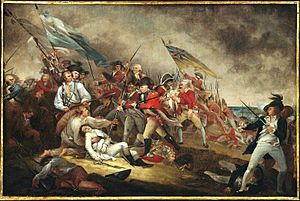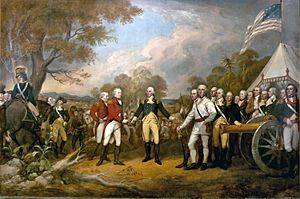Barzillai Lew facts for kids
Barzillai Lew (born November 5, 1743 – died January 18, 1822) was an African-American soldier who fought bravely during the American Revolutionary War. He was also a talented musician.
Contents
Early Life and Family
Barzillai Lew's parents were Primus and Margret Lew. They were free African Americans who married in 1742. Primus was a musician who served in the French and Indian War.
Barzillai, often called "Zeal," was born free in Groton, Massachusetts, on November 5, 1743. Like his father, Barzillai was a fifer (someone who plays a fife, a small flute-like instrument). He served in the English forces against the French and Native Americans in 1760. He was likely present when the British captured Montreal. People knew Lew as a "big and strong" man with amazing musical talent.
In the mid-1760s, Lew moved to Chelmsford, Massachusetts. He worked as a cooper, making barrels. Around 1766, he bought the freedom of Dinah Bowman (1744–1837) for 400 pounds. This amount would be about $28,000 today. They then got married.
Fighting for Freedom: The American Revolutionary War
The Battle of Bunker Hill

When the American Revolution began, Barzillai Lew joined Captain John Ford's Company on May 6, 1775. He served as a soldier, fifer, and drummer. Lew fought in the famous Battle of Bunker Hill on June 17, 1775. Military records describe him as a "cooper by trade, and quite dark-colored, a large man, six feet tall."
Bunker Hill was a very important battle. The American colonists, who were not very experienced, fought against highly trained British soldiers. About three dozen African-American soldiers, including Lew, also fought in this battle.
It was one of the bloodiest battles of the war. The British lost many soldiers, and the Americans also had many casualties. During the fight, it was said that Lew kept American spirits high. He played "There's Nothing Makes the British Run like 'Yankee Doodle Dandy'" on his fife. Barzillai Lew's powder horn from the war is now at the DuSable Museum of African American History in Chicago, Illinois.
Victory at Saratoga: Burgoyne's Surrender
In 1777, Barzillai Lew joined Captain Joseph Bradley Varnum's company of volunteers in Dracut, Massachusetts. His company marched to help the Northern army at Fort Ticonderoga.
Joseph Bradley Varnum’s son, John, wrote in his journal on November 1, 1777: "Zeal is selected for a fifer and fiddler for the grand appearance the day that Burgoyne's Famous Army is to be brought in." This "wonderful show" was the surrender of British General John Burgoyne to American General Horatio Gates at Saratoga. This happened after the Siege of Fort Ticonderoga (1777). Many African Americans from Massachusetts, both free and enslaved, served in local militias during the Revolution.
African Americans in the Continental Army
At first, General George Washington, the leader of the Continental Army, did not allow African Americans to serve. However, on January 2, 1778, Washington changed his mind. He responded to a letter from General James Mitchell Varnum (Joseph Bradley Varnum's brother). General Varnum suggested that Rhode Island could fill its troop numbers with black soldiers.
Washington encouraged Rhode Island Governor Nicholas Cooke to help with recruiting. In February, the Rhode Island government agreed. They offered freedom to enslaved people in return for military service. This led to the creation of the 1st Rhode Island Regiment, also known as the Varnum Continentals.
Life After the War
During the war, Barzillai Lew earned wages from his service. With this money, the Lew family bought a large farm in Dracut, Massachusetts (now part of Lowell, Massachusetts). They built a house there.
After the war, Lew returned to his farm. He continued to work as a cooper, making barrels for the Middlesex Canal Company. Barzillai and Dinah were active members of their church and community. They raised 13 children.
Barzillai, Dinah, and many of their children were talented musicians. They sang and played instruments all over New England. People said that "no family in Middlesex County from Lowell to Cambridge could produce so much good music." They formed a complete family band. They were hired to play at events in places like Portland, Maine and Boston, Massachusetts. They even played at college graduation ceremonies.
Dinah Bowman Lew might have been the first African-American woman pianist in American history. Barzillai Lew passed away in Dracut on January 18, 1822. Years later, Dinah Bowman Lew asked for and received a pension for her husband's military service.
Lew Family Legacy
After Barzillai Lew's death, his farm went to his sons, Zadock and Zimri. The Lew family continued to be known for their musical talents and contributions to the community.
In 1844, Zimri's son, Adrastus, married Elizabeth Freeman. They built a house that still stands today. Elizabeth Freeman Lew shared in 1912 that their house was part of the Underground Railroad. This was a secret network that helped enslaved people escape to freedom in Canada.
Adrastus and Elizabeth Lew had five sons and one daughter. Many of them achieved great things:
- James moved to Cambridge, Massachusetts. He formed a popular dance band and advised the Cambridge School Committee on music.
- William and Fred started a successful dry-cleaning and dyeing business in Lowell.
- William's son, Harry Lew, became the first African American to play professional basketball in 1902.
- Theresa Lew graduated from Lowell High School and taught at the Bartlett School for 25 years.
- Marion Lew also graduated from Lowell High School. She taught piano to many children in Lowell.
- Gerard Lew was a great athlete. He taught in a rural school in Virginia.
In 1943, the famous musician Duke Ellington wrote a piano piece to honor Barzillai Lew. It is believed that Ellington learned about Barzillai Lew from his history teacher, Carter G. Woodson.
 | May Edward Chinn |
 | Rebecca Cole |
 | Alexa Canady |
 | Dorothy Lavinia Brown |


